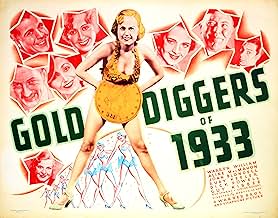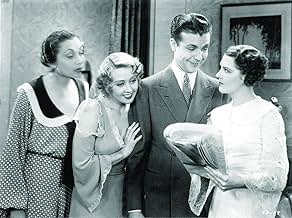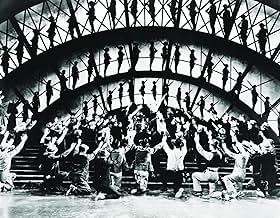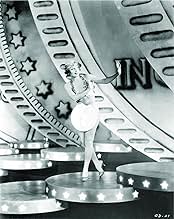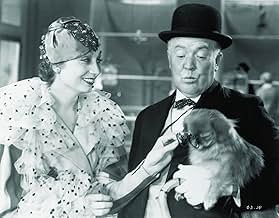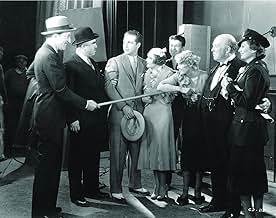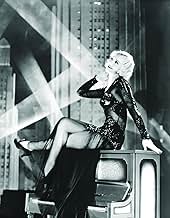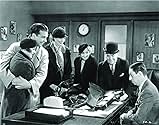IMDb RATING
7.7/10
9.6K
YOUR RATING
A wealthy composer rescues unemployed Broadway performers with a new play, but insists on remaining anonymous.A wealthy composer rescues unemployed Broadway performers with a new play, but insists on remaining anonymous.A wealthy composer rescues unemployed Broadway performers with a new play, but insists on remaining anonymous.
- Nominated for 1 Oscar
- 4 wins & 1 nomination total
Robert Agnew
- Dance Director
- (uncredited)
Loretta Andrews
- Gold Digger
- (uncredited)
Monica Bannister
- Gold Digger
- (uncredited)
Bonnie Bannon
- Gold Digger
- (uncredited)
Joan Barclay
- Gold Digger
- (uncredited)
Anita Barnes
- Gold Digger
- (uncredited)
Billy Barty
- Baby in 'Pettin' in the Park' Number
- (uncredited)
Busby Berkeley
- Call Boy
- (uncredited)
Bonnie Blackwood
- Chorus girl
- (uncredited)
Eric Blore
- Clubman
- (uncredited)
Featured reviews
Mervyn LeRoy directs this irresistible and touching depression-era musical. Busby Berkeley's choreography is as breath-taking as ever, as are the bevy of beautiful women in the elaborate productions. Many great musical numbers highlight this film including "We're in the Money" in which a then unknown, Ginger Rogers sings in Pig Latin. A host of other oddities can be found as always when Mr. Berkeley is involved. Ruby Keeler and Dick Powell are sensational as dancing and singing lovebirds and all works out well in the end. The show does close on a noticeably strange note with the very powerful protest number regarding the depression called "Forgotten Man" masterfully delivered by bombshell, Joan Blondell. A truly original and memorable musical.
with 42nd Street and Footlight Parade... Snappy, risqué, funny, great cast, great music. What more could you ask for? Joan Blondell, Aline McMahon, and Ruby Keeler are the gold diggers. Warren William, Dick Powell, and Guy Kibbee are their targets. Ginger Rogers is swell singing "We're in the Money" in Pig Latin. Ned Sparks, Sterling Holloway, Charles Lane, and Billy Barty are good. Great musical numbers including the opening "We're in the Money," the terrific finale "Forgotten Man" with Blondell and Etta Moten (singing in the window); "Petting in the Park" and "In a Shadow"---Powell and Keeler.... all classics. Fun all the way......
Look for Hobart Cavanaugh, Grace Hayle, Busby Berkley, Clarence Nordstrom, and one of the roller skating cops sure looks like Jack Carson.
Aline McMahon steals the show, and what a show it is!
Look for Hobart Cavanaugh, Grace Hayle, Busby Berkley, Clarence Nordstrom, and one of the roller skating cops sure looks like Jack Carson.
Aline McMahon steals the show, and what a show it is!
Made in the year when the global economic crash hit rock bottom, and the first signs of recovery began to appear, 'Gold Diggers' is very much a product of the Depression. Bread lines and penury are all around, but there is a jaunty air of optimism, too: "the long-lost dollar has come back to the fold".
Polly, Trixie and Carol are three vivacious and attractive showgirls who room together and scrape a precarious living by getting hired for each new Broadway musical as it crops up, and riding their luck until it closes - which is often before it even opens. On the fringe of their group hovers Fay, the smart blonde with the waspish tongue (Ginger Rogers).
The girls are 'gold diggers' in that they waste no opportunity to batten onto rich men. It is hinted during the course of the film that showgirls inhabit a shadowy region on the borders of prostitution, and the harsh economic realities of 1933 force the girls to regard their good looks as a marketable commodity.
A kind of innocent carnality runs through the film. Our three heroines actually sleep together. Fay thinks nothing of changing clothes with Carol, and she gets her backside slapped several times - by both men AND women. Trixie bathes with the door wide open, while Carol preens herself in the scantiest of negligees. The girls contrive to embarrass a rich snob by having him wake up undressed in Carol's bed. The script is loaded with playful smuttiness - taking 'Back Bay codfish' for a ride, making bedroom eyes and so forth.
It is in the show numbers, however, that the real naughtiness is on display. Busby Berkeley had had a phenomenal impact earlier in the year with his staged routines for "42nd Street", and a similar (but more risque) format is used here. Girls strip naked in silhouette, Ginger sings and dances all but nude for "We're In The Money", and metal chastity bodices are breached using can openers.
Ruby Murray and Dick Powell once again team up as the ingenue lovers, this time playing Brad and Polly - "a knockout for the mush interest". Murray is all coy charm and Powell's tenor voice is magnificent. Ginger is, as always, a beautiful and intelligent performer. Watch her pull off the gibberish verses in 'Money', and breezing through the comic dialogue in the apartment scene. Joan Blondell as Carol is simply adorable. Her sad face during the trick played on Lawrence is enough to tell us that she is falling in love. Her performance as The Spirit Of The Depression in "My Forgotten Man" is one of the great images in cinema history.
Warren and Dubin wrote the songs - and what songs! There are amusing, playful numbers like "Pettin' In The Park", with Berkeley choreography to match, and "We're In The Money" is deservedly famous. "In The Shadows" is a lovely ballad, with a set of geodesic walkways and electrically-illuminated violins. The spine-tingling climax is the anthemic "My Forgotten Man".
"Pettin' In The Park" was originally intended to be the closing number (hence Polly in her park outfit during the final reel), but the running-order was changed. A reprise of "Pettin'" as aural wallpaper in the restaurant scene is an understated gem, with a lovely arrangement featuring muted cornets. In a nice little in-joke, the producer likes Brad's songs so much, he decides to fire Warren and Dubin. By the way - who is the girl who sits silently in the armchair throughout that long scene?
The conception for "My Forgotten Man" was "men marching, marching, marching!" A sweeping epic is told in song and action as we see breadlines, tenements, Great War doughboys and much, much more - all in one song! Joan Blondell deters the heartless cop by pulling back the bum's lapel in a vignette of great emotional power. The musical styles range through torch song, jazz, blues and more. Listen out for the trumpet's counter melody as Joan speaks the verses, the negress on the window sill with the divine alto voice, the clarinet and sax obbligato after each sung line, and the gospel-style descant. "Gee, don't it get ya?"
Polly, Trixie and Carol are three vivacious and attractive showgirls who room together and scrape a precarious living by getting hired for each new Broadway musical as it crops up, and riding their luck until it closes - which is often before it even opens. On the fringe of their group hovers Fay, the smart blonde with the waspish tongue (Ginger Rogers).
The girls are 'gold diggers' in that they waste no opportunity to batten onto rich men. It is hinted during the course of the film that showgirls inhabit a shadowy region on the borders of prostitution, and the harsh economic realities of 1933 force the girls to regard their good looks as a marketable commodity.
A kind of innocent carnality runs through the film. Our three heroines actually sleep together. Fay thinks nothing of changing clothes with Carol, and she gets her backside slapped several times - by both men AND women. Trixie bathes with the door wide open, while Carol preens herself in the scantiest of negligees. The girls contrive to embarrass a rich snob by having him wake up undressed in Carol's bed. The script is loaded with playful smuttiness - taking 'Back Bay codfish' for a ride, making bedroom eyes and so forth.
It is in the show numbers, however, that the real naughtiness is on display. Busby Berkeley had had a phenomenal impact earlier in the year with his staged routines for "42nd Street", and a similar (but more risque) format is used here. Girls strip naked in silhouette, Ginger sings and dances all but nude for "We're In The Money", and metal chastity bodices are breached using can openers.
Ruby Murray and Dick Powell once again team up as the ingenue lovers, this time playing Brad and Polly - "a knockout for the mush interest". Murray is all coy charm and Powell's tenor voice is magnificent. Ginger is, as always, a beautiful and intelligent performer. Watch her pull off the gibberish verses in 'Money', and breezing through the comic dialogue in the apartment scene. Joan Blondell as Carol is simply adorable. Her sad face during the trick played on Lawrence is enough to tell us that she is falling in love. Her performance as The Spirit Of The Depression in "My Forgotten Man" is one of the great images in cinema history.
Warren and Dubin wrote the songs - and what songs! There are amusing, playful numbers like "Pettin' In The Park", with Berkeley choreography to match, and "We're In The Money" is deservedly famous. "In The Shadows" is a lovely ballad, with a set of geodesic walkways and electrically-illuminated violins. The spine-tingling climax is the anthemic "My Forgotten Man".
"Pettin' In The Park" was originally intended to be the closing number (hence Polly in her park outfit during the final reel), but the running-order was changed. A reprise of "Pettin'" as aural wallpaper in the restaurant scene is an understated gem, with a lovely arrangement featuring muted cornets. In a nice little in-joke, the producer likes Brad's songs so much, he decides to fire Warren and Dubin. By the way - who is the girl who sits silently in the armchair throughout that long scene?
The conception for "My Forgotten Man" was "men marching, marching, marching!" A sweeping epic is told in song and action as we see breadlines, tenements, Great War doughboys and much, much more - all in one song! Joan Blondell deters the heartless cop by pulling back the bum's lapel in a vignette of great emotional power. The musical styles range through torch song, jazz, blues and more. Listen out for the trumpet's counter melody as Joan speaks the verses, the negress on the window sill with the divine alto voice, the clarinet and sax obbligato after each sung line, and the gospel-style descant. "Gee, don't it get ya?"
With the success of "42nd Street," Warner Brothers wasted no time adding Busby Berkeley musical numbers to "Gold Diggers of 1933."
Starring Dick Powell and Ruby Keeler, this musical also has some of the same Depression darkness that permeated "42nd Street." "It's the Depression, dearie," Ginger Rogers says as the show she and her fellow chorines are laboring in closes in rehearsal due to lack of funding.
However, Brad (Powell), a composer in a nearby apartment who's sweet on Polly (Keeler), offers to give Ned Sparks the money he needs to produce his new show. His only condition is that Polly be featured.
Everyone wonders where he got the money, and a news item plus the fact that he refuses to appear in the show make the girls suspicious that he's a bank robber. In fact, he's the scion of a wealthy man (Warren William), who soon appears on the scene with his attorney (Guy Kibbee) when Brad steps in for the lumbago-ridden juvenile lead.
Polly's roommates Trixie and Carol (Joan Blondell and Aline MacMahon) go to work on the two immediately.
Though the film has some fantastic numbers - "We're in the Money," "The Shadow Waltz," "Pettin' in the Park," and great Busby Berkeley choreography, the middle section has no music and drags on as the gals meet the men, get them to pay for expensive hats, etc. This is probably because the film was completed when the musical numbers were added.
But the final number is worth the whole film. "Remember Your Forgotten Man" is a tribute to the World War I soldiers now out of work in the Depression, and not only are the production effects and choreography fantastic, but the singing as well, particularly the solo work by Etta Morton. Blondell, who from the sound of it in Dames was completely tone deaf, is beautifully dubbed here.
Ginger Rogers shines in a supporting role especially with her pig Latin lyrics to "We're in the Money" which were added after she was heard fooling around in a rehearsal. Powell is in gorgeous voice in all the numbers, but "I've Got to Sing a Torch Song" is a high point.
It's easy to watch the dancing, the beautiful women in their costumes, and listen to the singing and forget what in fact was going on in the '30s - after all, that's why these films were made.
But the "Forgotten Man" number serves as a reminder then and today that for the people sitting in the theaters, their troubles were right outside the door.
Starring Dick Powell and Ruby Keeler, this musical also has some of the same Depression darkness that permeated "42nd Street." "It's the Depression, dearie," Ginger Rogers says as the show she and her fellow chorines are laboring in closes in rehearsal due to lack of funding.
However, Brad (Powell), a composer in a nearby apartment who's sweet on Polly (Keeler), offers to give Ned Sparks the money he needs to produce his new show. His only condition is that Polly be featured.
Everyone wonders where he got the money, and a news item plus the fact that he refuses to appear in the show make the girls suspicious that he's a bank robber. In fact, he's the scion of a wealthy man (Warren William), who soon appears on the scene with his attorney (Guy Kibbee) when Brad steps in for the lumbago-ridden juvenile lead.
Polly's roommates Trixie and Carol (Joan Blondell and Aline MacMahon) go to work on the two immediately.
Though the film has some fantastic numbers - "We're in the Money," "The Shadow Waltz," "Pettin' in the Park," and great Busby Berkeley choreography, the middle section has no music and drags on as the gals meet the men, get them to pay for expensive hats, etc. This is probably because the film was completed when the musical numbers were added.
But the final number is worth the whole film. "Remember Your Forgotten Man" is a tribute to the World War I soldiers now out of work in the Depression, and not only are the production effects and choreography fantastic, but the singing as well, particularly the solo work by Etta Morton. Blondell, who from the sound of it in Dames was completely tone deaf, is beautifully dubbed here.
Ginger Rogers shines in a supporting role especially with her pig Latin lyrics to "We're in the Money" which were added after she was heard fooling around in a rehearsal. Powell is in gorgeous voice in all the numbers, but "I've Got to Sing a Torch Song" is a high point.
It's easy to watch the dancing, the beautiful women in their costumes, and listen to the singing and forget what in fact was going on in the '30s - after all, that's why these films were made.
But the "Forgotten Man" number serves as a reminder then and today that for the people sitting in the theaters, their troubles were right outside the door.
There is a pattern to 1930's Hollywood musicals; struggle to put on show proceeds alongside struggle for love to conquer all. And in the end both struggles are successfully concluded. It is a pattern that is broken by "Gold Diggers Of 1933". Sure, all of the usual elements are in place, including the Hungry, Penniless Showgirl Depression setting. But where this movie differs is in the fact that after the various plot strands are neatly tied up, it doesn't end. Instead, we are treated to the last big production number,"My Forgotten Man", as downbeat as it was possible to get in 30's Hollywood. All the Busby Berkeley musicals paid lip service to the Great Depression, but this one goes much further, as "My Forgotten Man" was the last, most enduring image of the film, and the one that audiences left the theatre with. It's placement was a brave decision on the part of whoever made it, and it would be interesting to learn of the public reaction at the time. Because while it is undoubtedly true that in an era of deprivation, you can't blithely make movies that are totally divorced from reality, it's equally true that people want to be reassured there is a better life, and they won't be scratching around in the dirt forever. Personally, I love the number, and it's placement. It's something that has fascinated me since my very first viewing 7 years ago, but it seems to be a point that not a lot of critics have picked up on. Perhaps it wasn't so unusual after all!
Did you know
- TriviaDuring rehearsals of "We're in the Money", Ginger Rogers began goofing off and singing in pig Latin. Studio executive Darryl F. Zanuck overheard her, and suggested she do it for real in the movie.
- GoofsWhen Brad plays piano for Mr. Hopkins, his fingers don't match the sound of the piano.
- Quotes
Trixie Lorraine: "Fanny" is Faneul H. Peabody, just the kind of man I've been looking for, lots of money and no resistance.
- ConnectionsEdited into Busby Berkeley and the Gold Diggers (1969)
- SoundtracksThe Gold Diggers' Song (We're in the Money)
(uncredited)
Music by Harry Warren
Lyrics by Al Dubin
Played during the opening credits and often in the score
Performed by Ginger Rogers (in English and Pig-Latin) and chorus
Played also as dance music by a band
- How long is Gold Diggers of 1933?Powered by Alexa
Details
Box office
- Budget
- $433,000 (estimated)
- Gross worldwide
- $105
- Runtime
- 1h 37m(97 min)
- Color
- Sound mix
- Aspect ratio
- 1.33 : 1
Contribute to this page
Suggest an edit or add missing content


